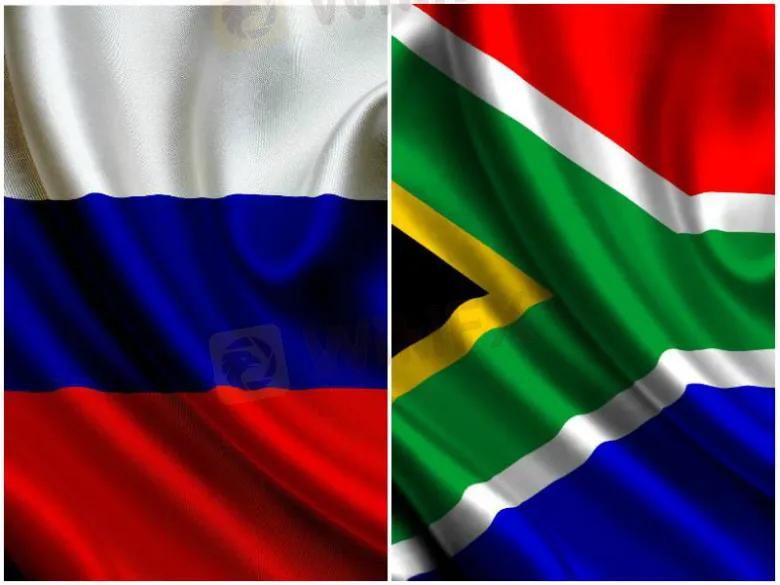简体中文
繁體中文
English
Pусский
日本語
ภาษาไทย
Tiếng Việt
Bahasa Indonesia
Español
हिन्दी
Filippiiniläinen
Français
Deutsch
Português
Türkçe
한국어
العربية
Does the Russo-Ukrainian war affect South African economy?
Abstract:There has been a lot that has been said about the ongoing war between Russia and Ukraine. A lot of the developed countries were trying to engage in putting this war to an end but we have not heard or seen much progress to a solid solution pertaining this matter that has shaken the whole world. Does Russia have major investments with South Africa?

The global financial system has been shaken amid the ongoing war between Russia and Ukraine. A lot of developed countries were trying to engage in putting this war to an end but we have not heard or seen much progress to a solid solution pertaining this matter that has shaken the whole world. Does Russia have major investments with South Africa?
According to trading economics.com “South Africa Imports from Russia of Parachutes and Rotochutes was US$253 during 2019, according to the United Nations COMTRADE database on international trade. South Africa Imports from Russia of Parachutes and Rotochutes - data, historical chart and statistics - was last updated on March of 2022.”
Russia – South Africa
In 2018, Russia exported services to South Africa worth $11.2M, with other business services ($5.7M), Computer and information services ($2.2M), and Transportation ($1.7M) being the largest in terms of value.
In 2019, Russia exported $494M to South Africa. The main products that Russia exported to South Africa are Copper Wire ($157M), Wheat ($92.9M), and Mixed Mineral or Chemical Fertilizers ($51.8M). During the last 24 years the exports of Russia to South Africa have increased at an annualized rate of 11.6%, from $35.2M in 1995 to $494M in 2019.
South Africa - Russia
In 2019, South Africa exported $648M to Russia. The main products that South Africa exported to Russia were Inorganic Salts ($111M), Manganese Ore ($102M), and Citrus ($92.9M). During the last 24 years the exports of South Africa to Russia have increased at an annualized rate of 10.1%, from $64.9M in 1995 to $648M in 2019.
In 2019, South Africa did not export any services to Russia.
Fuel prices and bread prices according to News24
On Thursday, the global oil price surged past $105 per barrel after Russia sent military forces into parts of Ukraine, increasing fears of a war in Eastern Europe. Russia is a key producer of crude oil and the market is nervous that oil supplies will be disrupted.
“Oil is South Africa's biggest import item, so the immediate impact on consumers' pockets will be higher petrol prices,” says Maarten Ackerman, chief economist at Citadel Investment Services.
Before the latest oil price spike, the petrol price looked set for a hike of around R1.25 a litre in the first week of March. This would push the price of 95 octane petrol in Gauteng to a record high of above R21.
However, the petrol price hike is now bound to be even steeper due to the latest oil run, as well as a sharp shock to the rand on Thursday.
South Africa buys oil in dollar, and therefore the fuel price is also determined by the exchange rate. On Thursday, the rand weakened by almost 3% to R15.46. A week ago, it was trading below R15.
As a consolation, Johann van Tonder, economist and researcher at Momentum Insights, points out that at least the fuel levy was not increased in the national budget tabled on Wednesday.
Analyst Peter Attard Montalto of Intellidex, thinks there could be a R1.30/litre petrol price hike in March and maybe another 30c/l to 40c/l hike in April - despite the freeze on a fuel levy increase.
“Higher petrol clearly affects the poorest most and can force the share of poor households' incomes spent on transport costs through the roof,” says Attard Montalto.
The US and EU have cut certain agreements and certain trades with Russia, Fuel prices are going up and mostly the goods that are transported will slightly go up in price which will lead the rand to be weaker compared to other currencies in the market. Find out more news on WikiFX on how you could take advantage of this trend.
Data from https://oec.world/en/profile/bilateral-country/rus/partner/zaf

Disclaimer:
The views in this article only represent the author's personal views, and do not constitute investment advice on this platform. This platform does not guarantee the accuracy, completeness and timeliness of the information in the article, and will not be liable for any loss caused by the use of or reliance on the information in the article.
Read more

Tradu Introduces Tax-Efficient Spread Betting for UK Traders
Tradu’s introduction of tax-efficient spread betting and groundbreaking tools like the Spread Tracker signals a new era of accessible, competitive, and innovative trading solutions for UK investors.

How Far Will the Bond Market Decline?
Recently, the yield on the U.S. 10-year Treasury bond reached a new high since April 2023, soaring to 4.7%.

Rising Risk of Japan Intervening in the Yen's Exchange Rate
The Japanese yen faces both internal and external pressures, with a potential intervention by the Japanese government looming.

Is the stronger dollar a threat to oil prices?
Oil prices dropped more than 1% on Wednesday, mainly due to the strengthening of the dollar and the increase in U.S. fuel inventories, which collectively suppressed the price rise.
WikiFX Broker
Latest News
SQUARED FINANCIAL: Your Friend or Foe?
Big News! UK 30-Year Bond Yields Soar to 25-Year High!
High-Potential Investments: Top 10 Stocks to Watch in 2025
Why Is Nvidia Making Headlines Everywhere Today?
Discover How Your Trading Personality Shapes Success
US Dollar Insights: Key FX Trends You Need to Know
FINRA Charges UBS $1.1 Million for a Decade of False Trade Confirmations
BI Apprehends Japanese Scam Leader in Manila
Bitcoin in 2025: The Opportunities and Challenges Ahead
Join the Event & Level Up Your Forex Journey
Currency Calculator






